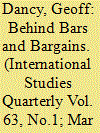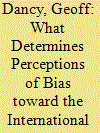|
|
|
Sort Order |
|
|
|
Items / Page
|
|
|
|
|
|
|
| Srl | Item |
| 1 |
ID:
165437


|
|
|
|
|
| Summary/Abstract |
The global transitional justice tool kit—involving the use of criminal prosecutions, amnesties, and other mechanisms to address past human rights abuse—has become a primary means for thwarting future human rights violations and consolidating democracy. Nevertheless, evidence on the consequences of transitional justice remains mixed and amenable to contradictory interpretations. Existing studies fail to adequately address issues of selection, the difference between short- and long-term effects of transitional justice mechanisms, and qualitative and quantitative differences in state practices. This article uses a new database of transitional justice mechanisms to address these concerns and test propositions from realist, constructivist, and holistic approaches to this set of policy issues. We find, among other things, that prosecutions increase physical integrity protections, while amnesties increase the protection of civil and political rights. Our analysis suggests that different transnational justice policies each play a potentially positive, but distinct, role in new democracies and in decreasing violations of human rights.
|
|
|
|
|
|
|
|
|
|
|
|
|
|
|
|
| 2 |
ID:
160339


|
|
|
|
|
| Summary/Abstract |
Do legal amnesties for combatants help end civil wars? International policy experts often take it for granted that amnesties promote negotiated settlements with rebels. However, a large number of amnesties are followed by continued fighting or a return to the battlefield. What, then, are the factors that make amnesties effective or ineffective? In this article I use a disaggregated data set of all amnesties enacted in the context of internal war since 1946 to evaluate a bargaining theory of amnesties and peace. Testing hypotheses about conflict patterns using models that account for selection, I find that (1) only amnesties passed following conflict termination help resolve civil wars, (2) amnesties are more effective when they are embedded in peace agreements, and (3) amnesties that grant immunity for serious rights violations have no observable pacifying effects. These policy-relevant findings represent a new breakthrough in an ossified “peace versus justice” debate pitting security specialists against global human rights advocates.
|
|
|
|
|
|
|
|
|
|
|
|
|
|
|
|
| 3 |
ID:
146192


|
|
|
|
|
| Summary/Abstract |
Over the last three decades, thousands of prosecutions for human rights abuses have progressed through domestic courts, a puzzling fact considering that state leaders have little incentive to punish their own agents. Previous studies have advanced rational-choice or sociological-institutionalist accounts of this phenomenon, emphasizing the role of political coalitions or regional cultures. Few, though, have recognized the local, private struggles that lie at the root of the trend toward domestic human rights enforcement. In this article, we develop a historical-institutionalist theory of normative change centered on the notion of “prosecutorial momentum.” We contend that the rise in domestic trials against rights-abusing state agents in Europe and Latin America results in large part from the cumulative efforts of victims and human rights lawyers utilizing their rights to private criminal prosecution. Using a new data set and mixed methods, we offer a systematic analysis of how rights to private criminal prosecution, when activated in response to a legacy of repression, helps set in motion sustained efforts to pursue domestic enforcement and compliance with international law.
|
|
|
|
|
|
|
|
|
|
|
|
|
|
|
|
| 4 |
ID:
157583


|
|
|
|
|
| Summary/Abstract |
The International Criminal Court’s interventions have prompted debate about the wisdom of criminally prosecuting combatants while attempting to build peace in conflict-ridden societies. Previous research fails to distinguish between different types of trials. Using a large-N dataset of three types of criminal trials undertaken during internal conflict – domestic security trials of rebels, domestic human rights trials of state agents, and international war crimes trials of both – this article tests a theory of the compellent effect of criminal prosecution on conflict termination. We find that, even when accounting for endogeneity, rebel trials are associated with a higher probability of conflict termination, while trials of state agents are weakly associated with conflict persistence. We argue that the former compel the opposition to discontinue fighting, while the latter signal to rebels a lack of government resolve. We also find that the effect of international trials, which at times appear weakly associated with conflict termination, is endogenous to international intervention more generally.
|
|
|
|
|
|
|
|
|
|
|
|
|
|
|
|
| 5 |
ID:
190839


|
|
|
|
|
| Summary/Abstract |
In states emerging from mass violence and human rights abuses, do individuals prefer retributive punishment of perpetrators through trials, or do they wish to be compensated with land or monetary reparations for their injuries? How does the concrete option of prosecutions by the International Criminal Court (ICC) moderate these preferences? Using unique survey data from 507 Kenyans collected in 2015, we build on and add nuance to the empirical literature that interrogates the link between exposure to mass violence and post-conflict justice preferences. We find that while some individuals prefer reparative justice, victims and witnesses generally want perpetrators to be prosecuted. Even for those who are co-ethnics of government leaders – who allegedly instigated widespread killing, sexual assaults and displacements – direct exposure to those acts leads to greater desire for prosecutions. We further find that one’s personal experience with violence also leads one to reject domestic justice in favor of international justice: victims and witnesses who favored retributive justice are highly likely to believe that the ICC is the best option for prosecuting perpetrators.
|
|
|
|
|
|
|
|
|
|
|
|
|
|
|
|
| 6 |
ID:
173138


|
|
|
|
|
| Summary/Abstract |
The International Criminal Court (ICC) has struggled with the perception that it is biased against Africans, especially in relation to its investigation in Kenya. But which Kenyans are most likely to believe the ICC is biased? Building on pluralistic models of public opinion and psychological studies, we aim to contribute to emerging research on attitudes toward international courts. We expect that group attachments will drive attitudes toward international institutions. Yet, we also theorize that exposure to violence makes individuals more likely to support international justice and reject narratives that would have the effect of insulating those who have committed crimes from being held accountable. Using new survey data from 507 Kenyans in the fall of 2015, we find support for our hypotheses.
|
|
|
|
|
|
|
|
|
|
|
|
|
|
|
|
|
|
|
|
|